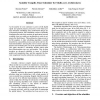Free Online Productivity Tools
i2Speak
i2Symbol
i2OCR
iTex2Img
iWeb2Print
iWeb2Shot
i2Type
iPdf2Split
iPdf2Merge
i2Bopomofo
i2Arabic
i2Style
i2Image
i2PDF
iLatex2Rtf
Sci2ools
DATE
2009
IEEE
2009
IEEE
Scalable compile-time scheduler for multi-core architectures
As the number of cores continues to grow in both digital signal and general purpose processors, tools which perform automatic scheduling from model-based designs are of increasing interest. This scheduling consists of statically distributing the tasks that constitute an application between available cores in a multi-core architecture in order to minimize the final latency. This problem has been proven to be NP-complete. A static scheduling algorithm is usually described as a monolithic process, and carries out two distinct functionalities: choosing the core to execute a specific function and evaluating the cost of the generated solutions. This paper describes a scheduling module which splits these functionalities into two sub-modules. This division produces an advanced scalability in terms of schedule quality and computation time, and also separates the heuristic complexity from the architecture model precision.
Automatic Scheduling | DATE 2009 | General Purpose Processors | Hardware | Static Scheduling Algorithm |
| Added | 20 May 2010 |
| Updated | 20 May 2010 |
| Type | Conference |
| Year | 2009 |
| Where | DATE |
| Authors | Maxime Pelcat, Pierrick Menuet, Slaheddine Aridhi, Jean-François Nezan |
Comments (0)

